Ta-Nehisi Coates to Write Captain America
The opinion journalist who has lately been writing the Black Panther comics is taking on one of the format's most iconic characters.
Ta-Nehisi Coates, who made his name as an opinion journalist but has lately been writing the Black Panther comics, is taking on one of the format’s most iconic characters. He explains why:
Two years ago I began taking up the childhood dream of writing comics. To say it is more difficult than it looks is to commit oneself to criminal understatement. Writers don’t write comics so much as they draw them with words. Everything has to be shown, a fact I knew going into the work, but could not truly know until I had actually done it. For two years I’ve lived in the world of Wakanda, writing the title Black Panther. I’ll continue working in that world. This summer, I’m entering a new one—the world of Captain America.
[…]
Writing is about questions for me—not answers. And Captain America, the embodiment of a kind of Lincolnesque optimism, poses a direct question for me: Why would anyone believe in The Dream? What is exciting here is not some didactic act of putting my words in Captain America’s head, but attempting to put Captain America’s words in my head. What is exciting is the possibility of exploration, of avoiding the repetition of a voice I’ve tired of.
[…]
[N]othing should really scare a writer more than the moment when they are no longer scared. I think it’s then that one might begin to lapse into self-caricature, endlessly repeating the same insights and the same opinions over and over. I’m not convinced I can tell a great Captain America story—which is precisely why I want so bad to try.
[…]
Captain America #1 drops on the Fourth of July.
While I was an avid collector, including of Captain America, from 7th grade through college, I’ve only read a handful of comics since. But this is quite intriguing.
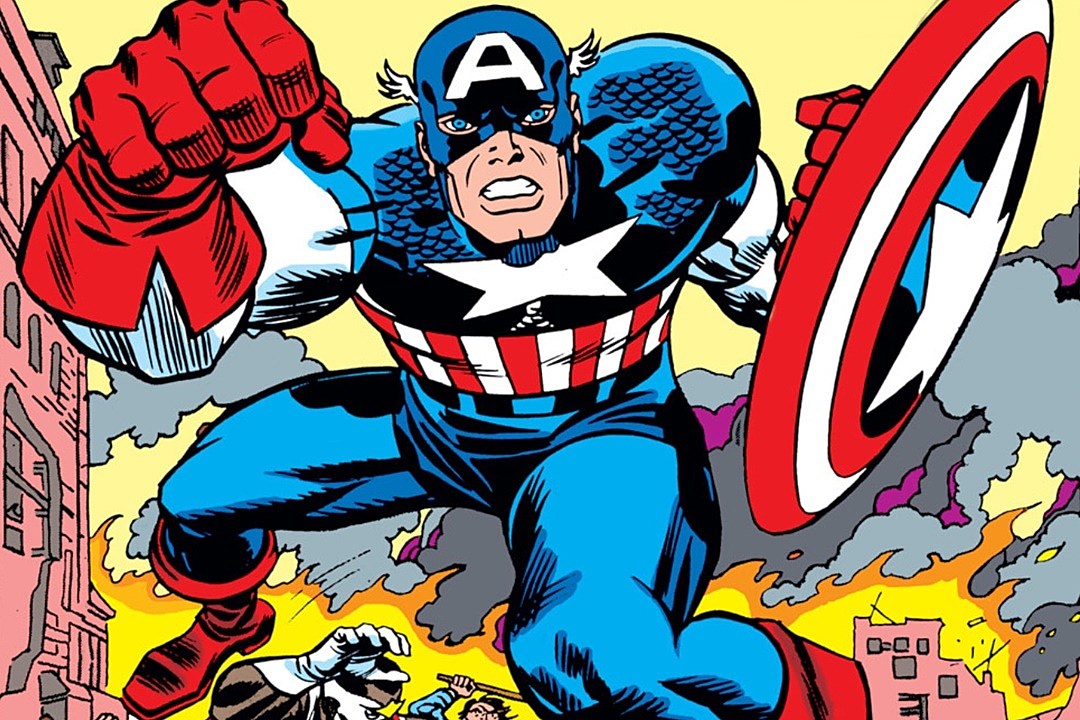

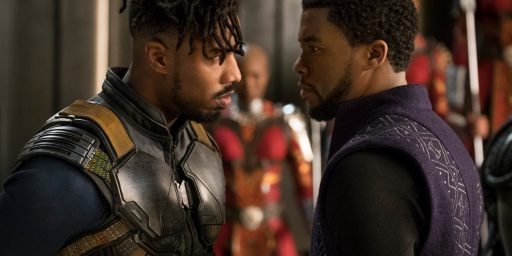
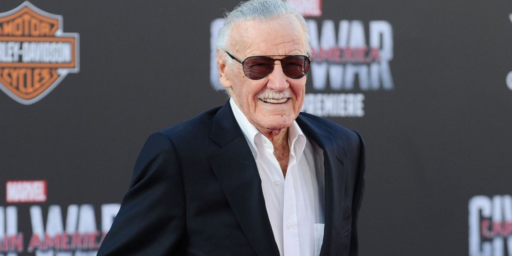
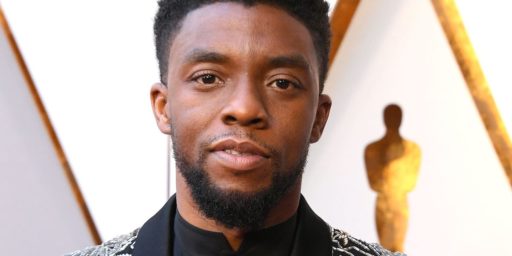
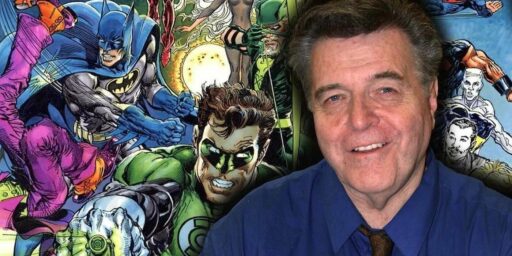
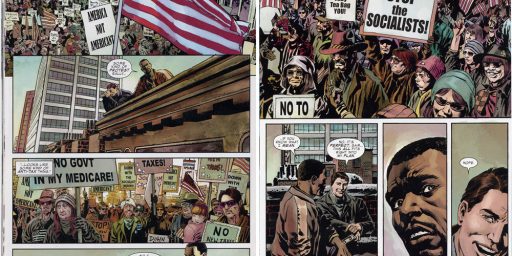
Yep. Been there.
You could hardly do worse than the guy you’re replacing, who thought making Captain America a secret Nazi spy was a good idea.
As a charter member of the Golden Horde, I bow to the Great Khan, Ta-Nehisi Coates, and wish him well in this latest endeavor. Yes, I’m one of the weirdos.
And @JamesJoyner, that you would post this is one of the many reasons I trust you, as came up recently.
The sales of Coates’s “Black Panther” have been pretty bad for a character the normal world has been talking about since “Captain America: Civil War,” which came out over a year and a half ago. I wonder if he would have had better results in the era of Stan Lee-style plotting as opposed to the half-assed screenplay storyboarding that’s standard in super-hero comics today. The man can certainly write and the comic fans who made an icon out of Brian Michael Bendis don’t exactly have the highest standards in the world.
Mike
I’m old enough to remember when the high-brow set would sneer at the popular entertainments of Stephen King and no public intellectual would deign to write for the comics.
I’m glad that we don’t live in that world anymore, but I have no interest in the Coates-written arcs for these characters. It’s not his fault. I’m just not interested in these characters.
The box office success of Black Panther and Wonder Woman probably has several different reasons but one I don’t hear about is that they were heroes. Iron Man, Thor, all of the X Men, good movies or bad, have been about what it means to be the super heroes themselves. Tony Stark is a hot mess. Black Widow is haunted by her past. Thor is a spoilt brat (at least in the first and second movies). But Black Panther and Wonder Woman took their selflessness and heroism for granted. They didn’t ask the question: “How can this frail human being become a hero?”, but rather, “How does a Hero make difficult real world decisions and adapt to unknown situations?” I wonder how much of their success was due to the fact that the world needs some heroes right now, straightforward, unambiguous heroes.
The first Captain America movie was in the Black Panther / Wonder Woman vein. He was a hero from childhood, and obtained the superpower later on. But his subsequent appearances dwelt on his dislocation in time, and his struggles in understanding his place in a world more morally complex than he was prepared for, where all his friends and family are gone. I hope Coates returns him to his basic heroism and explores the hard decisions even fundamentally heroic people have to make, and the ways that the morally ambiguous but powerful people can lash them to purposes not their own.
@Stormy Dragon: A thousand times this. UGH.
@MarkedMan All superhero stories engage with the question of “what makes someone a hero?” All of them. I submit that T’Challa is not a hero until the very end of the film. Before then, he was basically a cop and a soldier. As opposed to Steve Rogers, who starts out with the heart of a hero, and gains the abilities to match. But in Civil War, he goes off the rails a bit, putting his own needs ahead of heroic abilities. He deserves this, but it also affects his hero”ness”.
@Jay L Gischer: I agree with what you are saying. My point was more on how the question was focused. In the Thor/Ironman/Black Widow wing, it’s about how it affects them personally. What are their demons? Are they really ready for this life? Is there a way out of it? Could they leave it, hide from it? How does it affect their relationships? In WW/BP it takes the fact that they are committed to doing the right thing, that their personal demons aren’t really at issue. The core conflict comes from the difficulty of knowing what is the right thing.
There’s no need to pick which is better. Any story well written can be a joy, no matter the weakness of the plot. Just ask Willy Shakespeare (Two sets of twins! Separated at birth! No knowledge of each other! Given the same names! Accidentally reunited! I Love Lucy hilarity ensues!). I just think we may be ready for some heroes who aren’t conflicted about their own motivations.
@MarkedMan:
Amusingly, one of the biggest differences between Peter Jackson’s Lord of the Rings movies and the original book was precisely that — Jackson couldn’t stand the Aragorn of the books who knew he was the rightful and deserving king and set about making that happen so that he could fix the world and win his bride. So he made him a modern conflicted anti-hero who only took on the whole kingship thing in order to get permission from
Steven TylerElrond to marry his daughter.